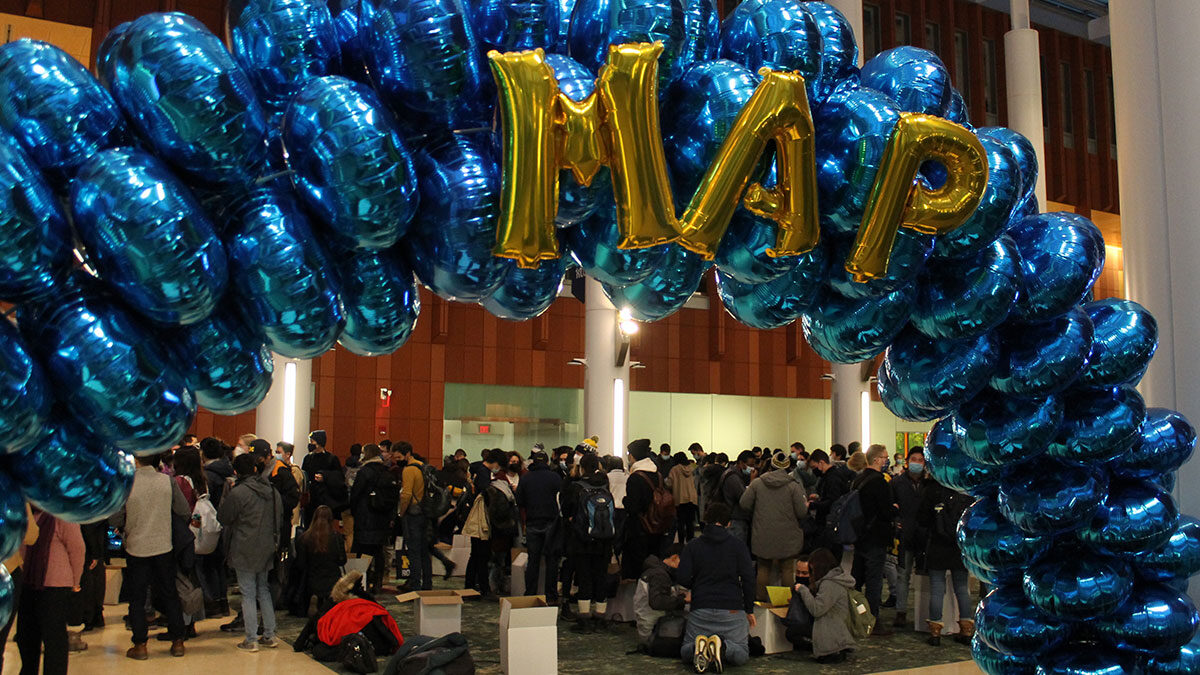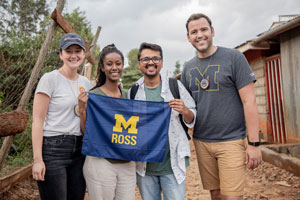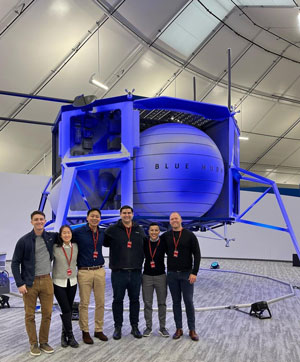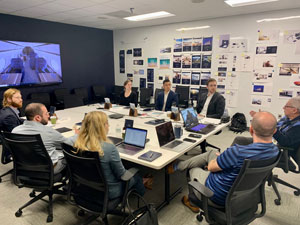
Initially conceived as a signature component of the full-time MBA curriculum, MAP is now a required course in the part-time MBA, Executive MBA, and Global MBA programs at Michigan Ross. In the last five years, there has been further growth into the BBA and one-year master’s degree programs at the school, to the point where nearly every Ross student now has the opportunity to participate in MAP or a similar course. To date, more than 17,000 students have taken part in more than 3,100 projects.
MAP — which stands for Multidisciplinary Actions Projects — involves a small team of students taking on an in-depth, real-world challenge for a sponsoring company or nonprofit organization.

“The foundational benefit of MAP, and why it is such a crucial part of the Full-Time MBA Program, is that it embodies the Michigan Ross belief in action-based learning,” said Brad Killaly, associate dean for Full-Time MBA Programs. “We believe MAP provides an exceptional opportunity, and perhaps unrivaled opportunity in all of MBA education, for students to learn by working on a really important issue facing real companies across industries and functions where our students want to gain experience working in. As a result, it positions students for success in securing top jobs and excelling in their internships, along with providing valuable leadership and teamworking skills they can use throughout their academic and professional journeys.”
Izak Duenyas, associate dean for Executive Programs at Michigan Ross, also said he believes MAP provides significant value to executive MBA students.
“MAP has been a wonderful element of the Executive MBA Program. Many of our EMBA students really look forward to their MAP projects and regard it as a signature component of the program,” said Duenyas. “MAP is also something that the students definitely pay attention to when choosing which EMBA program to attend.”
Improving collaboration
One key to the success of MAP — the reason students love it, and the reason companies often return as sponsors year after year — is that the collaboration is a true win-win.
Michigan Ross students gain an irreplaceable educational opportunity to test their capabilities, learn new skills, experience a new industry or function, and often travel. Companies, meanwhile, get well-considered, actionable recommendations from some of the top minds in business.
In fact, the increasing quality of that collaboration — particularly using virtual tools implemented during the COVID-19 pandemic — was an important development in MAP over the last few years, according to Chris Tarnacki, managing director of the Office of Action-Based Learning at Michigan Ross.
“The school, our sponsors, faculty, and students have all committed to high-quality and robust MAP experiences, even when significant time on site was not possible,” Tarnacki noted. “As we hopefully emerge from the challenges created by COVID, MAP is uniquely positioned to address the new challenges and opportunities organizations face in a rapidly changing world.”
Tarnacki said MAP is designed to reflect the changing nature of work to prepare students for their future careers.
“It gives students a good preview of what work will be like once they leave here, because so many companies are doing work from different locations,” he explained. “You’re undoubtedly going to have to learn how to work and build relationships with people who are not always there with you. It’s great practice for doing that.”
Tarnacki added that another major change to MAP in recent years involves improved collaboration within the student teams — investing more time and resources into helping them function at their best. Drawing on work by the Center for Positive Organizations and the Sanger Leadership Center, MAP teams now benefit from workshops on topics like resilience, working with a sponsor, and giving and receiving feedback.
“We seek to create transformative, action-based learning experiences that reflect the academic rigor that Michigan Ross is known for,” said Gretchen Spreitzer, associate dean of Engaged Learning and Professional Development at Michigan Ross. “Taking this group of students that may have not collaborated with each other before, how do you very quickly onboard them and establish good practices so they can work well together and execute a high-quality deliverable? We give students this additional content and then provide a platform to apply it immediately.”
Growing the program
Expanding MAP (or, in some cases, MAP-like experiences) throughout the Michigan Ross degree programs is another critical development in recent years.
“It’s something that is core to us as a school. I am excited about the fact that it really does exist across all of our degree programs at this point,” Tarnacki said. “New action-based learning courses are launching in the next academic year within our rapidly growing portfolio of One-Year Master’s programs. Both our Master of Management and the first cohort of Master of Business Analytics students will participate in action-based learning during the winter 2023 term.”
Last year, students in the Michigan Ross Online MBA Program had the opportunity for the first time to participate in MAP, a key differentiator of the school’s innovative online offering.
“MAP is one of the key drivers of applicants to the part-time MBA programs,” said Patti Russo, managing director of Part-Time MBA Programs at Michigan Ross. “They often see their projects as a way of stepping out of their functional role — engineers trying a marketing project, for example, or industry, such as choosing a project with a nonprofit.”
Student participants to engaged alumni sponsors

Perhaps the core theme of MAP is the mutually beneficial nature of the program, with sponsors and students alike praising its value.
“Students tell us they benefit from it; it impacts their career outcomes. It’s really positive,” Tarnacki said. “Meanwhile, we do 175 of these projects a year, and many sponsors come back year after year. So I think that’s really good evidence that they’re getting value out of these projects.”
Duenyas agreed with Tarnacki.
“The quality of the work that the executive MBA students do for MAP has been consistently very high, which pleases the sponsors, and we have many repeat sponsors,” he said. “We also have many of our EMBA alumni bringing us MAP projects so the MAP program also enables us to strengthen our relationships with our alumni.”
Duenyas’ thoughts speak to one the biggest testimonials of the value of MAP over the years: Michigan Ross graduates tend to be some of the biggest boosters of sponsoring MAP projects in the companies they go to work for.
“Maybe they’re not even super senior within the organization, but they’re able to very easily identify those issues that their team is facing, and they’ll advocate for MAP,” Tarnacki said. “Well over half of our projects involve alumni in some capacity. Knowing you have this resource available to you at your organization is absolutely an advantage of being a part of the Ross alumni community.”
Value for students
Sam Epstein, MBA ’20 — senior manager of new business development at Dexcom, a medical device company and regular MAP sponsor — has seen MAP from both sides.
“On a personal level, I wouldn’t be at Dexcom without (fellow Dexcom executives) Brian Chung and Ryan Ruehl sponsoring my MAP project back in 2019. Dexcom wasn’t on my radar, and the MAP experience (with Brian and Ryan’s strong and fun guidance) helped me understand both how a medical device company functioned and how promising it could be to potentially work here. MAP serves as a medium to help enhance cross-functional collaboration, helping the students, and as a result, ourselves, assess an opportunity.”
MAP is currently wrapping up for this year’s first-year full-time MBA students, and their positive reactions echo those of past cohorts. Tim McHale, MBA ’23, who has been working on a project for General Motors, said of the experience: “MAP has been a great way to apply all that I have learned throughout my first year at Ross and my previous work experience. I’ve established deep connections with my teammates, and it has been incredible to see how much our sponsors value our insights.”
MAP has pushed me out of my comfort zone and given me an opportunity to dive into sustainability and renewable energy. These have been passions of mine since changing careers, and sustainability is a core element of our project. I have been able to learn so much in such a short time which has helped deliver value and insightful guidance to our sponsor team.
Tim McHale, MBA ’23
McHale’s teammate, Katie Schlafhauser, MBA ’23, also had extremely positive feedback about working on the MAP project.
“MAP has been the perfect opportunity for me to really apply everything I learned over the first year, including financial analysis, strategy, leadership, and so much more. I have had the unique opportunity to design a strategy for one of the largest automakers in the world, and have gotten to meet and work with some pretty incredible individuals.”
Value for sponsors

MAP sponsors include a wide range of organizations, from small startups to some of the world’s biggest companies. Amazon, for example, has become a major MAP sponsor. Joey Hartman, senior manager of product management at Amazon Grocery, said of the program: “MAP is a win-win for both Amazon and Michigan students. From Amazon’s perspective, we love the fresh thinking that students provide on impactful projects. MAP also continues to serve as an awesome talent pipeline to the university, which is reflected by the high number of Rossers who join Amazon every year.
“From a student perspective, we believe that the structure and leadership principles learned through MAP help prepare the students for success in their summer internships and beyond. Additionally, the students gain firsthand experience of what it’s like to work at Amazon, which is a valuable reference point as they consider full-time job opportunities following graduation.”
Dan Smith, executive vice president and chief growth officer at Owens Corning, expressed similar thoughts: “Most important, we sponsor MAP because we believe in the quality of work the students provide. Michigan MBA students are among the brightest and most diverse in the world — and Owens Corning values the perspective and force they bear on the most important questions in our company. Second, we want to be top of mind for these students when they are looking for opportunities both immediately upon graduation and later down the road of their career.”
Brian Chung, director of new business development at Dexcom, said their MAP teams provide “insights that are relevant and strategic, an outside perspective that remains objective and unbiased, timely execution of deliverables, actionable next steps, and thought-provoking recommendations.”
MAP projects at Dexcom are incredible opportunities for us to connect real-world business issues with a focused and talented team of budding business professionals from Ross.
Brian Chung, director of new business development at Dexcom


